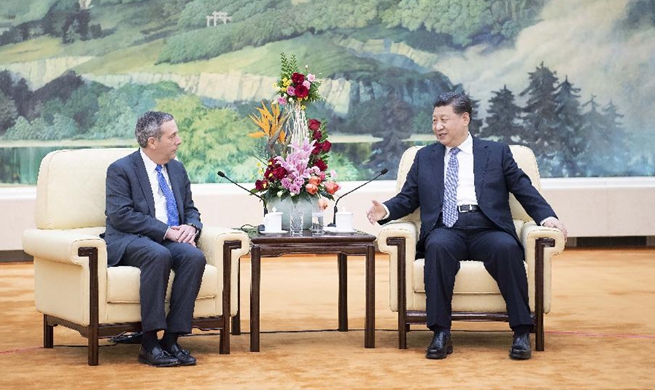BERLIN, March 20 (Xinhua) -- The German government has approved the key figures of the country's draft budget for 2020, Finance Minister Olaf Scholz announced here on Wednesday.
Expenditures are expected to increase by 1.7 percent to about 363 billion euros (415.2 billion U.S. dollars) next year. For the seventh year in a row, the German government does not intend to incur new debt. The 2020 budget is scheduled to be formally adopted by the German government in June.
The draft budget aims to set "the right political priorities," Scholz said, emphasizing the need for "increased budgetary discipline" in the coming years. Spending increase without new debt could not be considered "a matter of course" in view of the economic risks entailed, he said.
Scholz's list of priorities is topped by social policy measures.
"It is good to support citizens in need with transfers, because this makes the social market economy strong," commented Niklas Potrafke, director of the ifo Center for Public Finance and Political Economy.
"Social spending, however, often does not reach those in need, but rather redistributes from the right to the left pocket, favors interest groups or favors (the decision-making party's) own voters," said Potrafke, adding that politicians must keep the targeting of social spending under control.
Criticism also came from the German industry. "Unfortunately, the hoped-for signal effect for Germany as a business location does not emerge from the federal budget for 2020," said Eric Schweitzer, president of the Association of German Chambers of Industry and Commerce (DIHK).
"We must release the brakes on investment -- in particular by lowering tax rates and improving depreciation conditions," recommended Schweitzer. Avoiding new debts only would not be sufficient.
International criticism of the German budget plans came from the U.S. Ambassador to Germany Richard Grenell, who had complained that Germany's proposed military spending of 45 billion euros in Scholz' budget plan was too little.
"The fact that the German government is even considering reducing its already unacceptable contributions to military readiness is a disturbing signal from Germany to its 28 NATO allies," said Grenell, as Germany would be moving away from NATO's goal of spending 2 percent of a country's gross domestic product (GDP) on defense.
German Chancellor Angela Merkel shrugged off Grenell's criticism and stated that Germany had increased its defense spending year after year. "Real spending is what matters, and this has always been corrected upwards," Merkel stressed.













